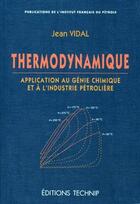-
Date de parution : 01/06/2003
-
Editeur :
Technip
-
EAN : 9782710808008
-
Série :
(-)
-
Support :
Papier
Résumé:
The simulation and optimization of processes assumes that the thermodynamic properties and phase equilibria of the mixtures concerned are well known. This knowledge is still based upon experimentation, but it is also the result of calculation methods based on the principles of thermodynamics... Voir plus
The simulation and optimization of processes assumes that the thermodynamic properties and phase equilibria of the mixtures concerned are well known. This knowledge is still based upon experimentation, but it is also the result of calculation methods based on the principles of thermodynamics that govern them, insure their coherence, and confer upon them a wide range of application. This text is concerned primarily with the description of these methods and their evolution. It is addressed to the student who wishes to apply the general principles he has learned, and to the engineer confronted with a choice, perhaps a difficult one, of the most appropriate method to solve his problem. This textbook devotes extensive space to fundamental concepts. It also places particular emphasis on the "models" that, although based on simplified concepts of the subject matter at the molecular level, have "predictive" character. Computational examples are used to explain the application of these concepts and models. A comprehensive bibliography allows the reader to broaden the understanding he has acquired from this text. These calculation models are not perfect. Future progress makes thermodynamics as applied to chemical engineering an evolving discipline. The engineer must keep abreast of this progress and evaluate it intelligently.
Donner votre avis









